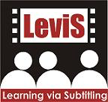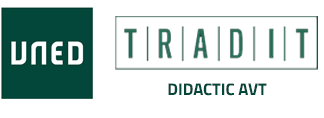EU-FUNDED PROJECTS
 Clipflair was a project funded by the European Commission (Lifelong Learning Programme, 2011-2014), carried out with the participation of 10 European universities from Spain, Greece, United Kingdom, Romania, Estonia, Poland, Portugal and Ireland. It was initiated and co-coordinated by Stavroula Sokoli, member of the TRADILEX work team. The platform (www.clipflair.net) offers more than 400 activities developed by teachers to promote different language skills in more than 20 languages through Audiovisual Translation. In addition, the platform offers tools (subtitle editor, audio recorder and other elements that enhance its didactic value) which can be used by authors to create new activities or modify existing ones adapting them to the specific needs of any user, in formal and non-formal environments, face-to-face, semipresential or remotely. Noa Talaván, TRADILEX coordinator and Jennifer Lertola, team member, were also part of the project as collaborators and designers of subtitling and audio description activities for learning English that are available in the Clipflair gallery
Clipflair was a project funded by the European Commission (Lifelong Learning Programme, 2011-2014), carried out with the participation of 10 European universities from Spain, Greece, United Kingdom, Romania, Estonia, Poland, Portugal and Ireland. It was initiated and co-coordinated by Stavroula Sokoli, member of the TRADILEX work team. The platform (www.clipflair.net) offers more than 400 activities developed by teachers to promote different language skills in more than 20 languages through Audiovisual Translation. In addition, the platform offers tools (subtitle editor, audio recorder and other elements that enhance its didactic value) which can be used by authors to create new activities or modify existing ones adapting them to the specific needs of any user, in formal and non-formal environments, face-to-face, semipresential or remotely. Noa Talaván, TRADILEX coordinator and Jennifer Lertola, team member, were also part of the project as collaborators and designers of subtitling and audio description activities for learning English that are available in the Clipflair gallery
 LeVis (Learning via Subtitling) was a project funded by the European Commission (Socrates/Lingua 2006-2008), predecessor of ClipFlair, led by Hellenic Open University with the participation of 5 universities (from Spain, Hungary, Portugal, United Kingdom, Romania), and was also initiated and coordinated by Stavroula Sokoli, member of the TRADILEX team. LeViS developed the first subtitling tool specific for language learning. According to the surveys carried out at the end of the project, the simulation of this professional activity, using authentic materials, and applying specific competencies such as understanding and producing texts and solving linguistic problems, promotes L2 learning, but also helps develop translator skills..
LeVis (Learning via Subtitling) was a project funded by the European Commission (Socrates/Lingua 2006-2008), predecessor of ClipFlair, led by Hellenic Open University with the participation of 5 universities (from Spain, Hungary, Portugal, United Kingdom, Romania), and was also initiated and coordinated by Stavroula Sokoli, member of the TRADILEX team. LeViS developed the first subtitling tool specific for language learning. According to the surveys carried out at the end of the project, the simulation of this professional activity, using authentic materials, and applying specific competencies such as understanding and producing texts and solving linguistic problems, promotes L2 learning, but also helps develop translator skills..
EDUCATIONAL INNOVATION PROJECTS AND NETWORKS
Radio programme on educational innovation projects and teacher networks at UNED
Course 2009-2010
CONTACT, COllaborative Network for Translation and adaptation ACTivities.
Course 2010-2011
CATIL, Collaborative Audiovisual Translation to Improve Translation and Language Skills.
Course 2011-2012
DST, Dubbing and Subtitling to improve oral production: a Transferable skills approach.
Course 2012-2013
RECORDS, REvoiCing to enhance Oral pRoDuction Skills.
iCap. intralingual Captioning for writing skills and vocabulary enhancement within an integrated skills framework.
Course 2014-2015
iDub, intralingual Dubbing to improve oral production skills.
Course 2015-2016
SubLITE. Subtitles for the Deaf and Hard of Hearing to Improve Listening and WriTing Skills in Foreign Language Education.
OffTaGe, Offensive and Taboo languaGe dubbed and subtitled by students.
Course 2017-2018 (teaching innovation group ARENA)
CREATE, CREATivE dubbing and subtitling: new resources in language learning.
VICTOR, Voice-over to improve oral production skills
Course 2018-2019 (teaching innovation group ARENA)
SUBFILM, Subtitling to improve writing and translation skills: making short films accessible
Course 2019-2020 (teaching innovation group ARENA)
AUDIOSUB, Audiodescription and subtitling for the Deaf and hard of hearing: audiovisual accessibility for foreign langauge learning
Course 2020-2021 (teaching innovation group ARENA)
VOCAL, Voice over and language learning
Publications related to all the previous projects (European and innovation)
Baños, Rocío & Sokoli, Stavroula (2015). “Learning Foreign Languages with ClipFlair: Using Captioning and Revoicing Activities to Increase Students’ Motivation and Engagement”. In Kate Borthwick, Erika Corradini & Alison Dickens (eds). 10 Years of the LLAS E-learning Symposium: Case studies in Good Practice. Dublin: Research-publishing.net, pp. 203–213.
Talaván, N., Bárcena, E., & Villarroel, Á. (2014). Aprendizaje colaborativo asistido por ordenador para la transferencia de las competencias mediadora y lingüístico-comunicativa en inglés especializado. In M. L. Pérez Cañado & J. Ráez Padilla (Eds.), Digital Competence Development in Higher Education: An International Perspective (pp. 87–106). https://doi.org/10.3726/978-3-653-04536-9
Hadzilacos, Thanasis; Papadakis, Spyros & Sokoli, Stavroula (2004). “Learner’s Version of a Professional Environment: Film Subtitling as an ICTE Tool for Foreign Language Learning”. In Proceedings of E-learn 2004 World Conference on E-Learning in Corporate, Government, Healthcare, and Higher Education, 2004 in Washington, DC, USA. San Diego, CA: Association for the Advancement of Computing in Education (AACE), pp. 680–685.
Sokoli, Stavroula (2006). “Learning via Subtitling (LvS). A Tool for the Creation of Foreign Language Learning Activities Based on Film Subtitling”. In Mary Carroll & Heidrun Gerzymisch-Arbogast (eds). Proceedings of the Marie Curie Euroconferences MuTra: Audiovisual Translation Scenarios – Copenhagen 1-5 May 2006, pp. 66–73.
Sokoli, Stavroula (2015) “Foreign Language Learning through Interactive Revoicing and Captioning of Clips”. In Yves Gambier, Annamaria Caimi & Cristina Mariotti (eds). Subtitles and Language Learning. Bern: Peter Lang, 127–148
Sokoli, Stavroula (2018). “Exploring the Possibilities of Interactive Audiovisual Activities for Language Learning”. Translation and Translanguaging in Multilingual Contexts (Special Issue Audiovisual Translation in Applied Linguistics: Educational Perspectives), 4(1), 77–100.
Talaván, N., & Rodríguez-Arancón, P. (2014). The use of reverse subtitling as an online collaborative language learning tool. Interpreter and Translator Trainer, 8(1), 84–101. https://doi.org/10.1080/1750399X.2014.908559
Talaván, N., & Ávila-Cabrera, J. J. (2015). First insights into the combination of dubbing and subtitling as L2 didactic tools. In Y. Gambier, A. Caimi, & C. Mariotti (Eds.), Subtitles and Language Learning (pp. 149–172). Bern: Peter Lang.
Talaván, N., Rodríguez-Arancón, P., & Martín-Monje, E. (2015). The Enhancement of Speaking Skills Practice and Assessment in an Online Environment. In M. L. Cancelas y Ouviña & S. Sánchez Rodríguez (Eds.), Tendencias en Educación y Lingüística (pp. 329–351). Cádiz: Editorial GEU.
Talaván, N., & Lertola, J. (2016). Active audiodescription to promote speaking skills in online environments. Sintagma, Revista de Lingüística, 28, 59–74. https://doi.org/10.21001/sintagma.2016.28.04
Talavan, N., Lertola, J., & Costal, T. (2016). iCap: Intralingual Captioning for Writing and Vocabulary Enhancement. Alicante Journal of English Studies, 29, 229–247.
Talaván, N., Ibáñez, A., & Bárcena, E. (2016). Exploring collaborative reverse subtitling for the enhancement of written production activities in English as a second language. ReCALL, 29(1), 39–58. https://doi.org/10.1017/S0958344016000197
Talaván, N., & Costal, T. (2017). iDub – The potential of intralingual dubbing in foreign language learning: How to assess the task. Language Value, 9(1), 62–88.
Talaván, N., & Rodríguez-Arancón, P. (2018). Voice-over to improve oral production skills. In J. D. Sanderson & C. Botella-Tejera (Eds.), Focusing on Audiovisual Translation Research (pp. 211–236). Valencia: PUV, Publicacions Universitat de Valencia.
Talaván, N. (2019). Using subtitles for the deaf and hard of hearing as an innovative pedagogical tool in the language class: International Journal of English Studies, 19(1), 21–40. https://doi.org/10.6018/ijes.338671
Talaván, N. (2019). Creative audiovisual translation applied to foreign language education: a preliminary approach. Journal of Audiovisual Translation, 2(1), https://www.jatjournal.org/index.php/jat/article/view/57.
RESEARCH GROUPS
TRADIT (TRAducción auDIovisual didáctica / Didactic audiovisual translation)
ARENA (Accesibilidad, traducción audiovisual y aprendizaje de lenguas / Accessibility, audiovisual translation and language learning)
OTHER EXTERNAL PROJECTS
 Pluritav (Audiovisual translation as a tool for the development of multilingual skills in the classroom) is a Spanish project (2016-2019) which explored new tools to expand and improve language skills. The project is based on a multilingual approach, taking into account not only the language being studied, but also the linguistic diversity of the classroom. Pluritav focuses on teaching and language improvement, and promotes the use of AVT for foreign language learning, improving skills in one’s own languages and developing multilingual skills.
Pluritav (Audiovisual translation as a tool for the development of multilingual skills in the classroom) is a Spanish project (2016-2019) which explored new tools to expand and improve language skills. The project is based on a multilingual approach, taking into account not only the language being studied, but also the linguistic diversity of the classroom. Pluritav focuses on teaching and language improvement, and promotes the use of AVT for foreign language learning, improving skills in one’s own languages and developing multilingual skills.
 Babelium Project was funded by the European Commission (Lifelong Learning Programme, 2013-2015) and coordinated by the University of the Basque Country. Within the framework of the project, a group of software design experts created a platform to develop oral expression skills in language learning through AVT tools. The online software was open and free (no longer available), and targeted students and teachers, who could upload videos and create activities based on captioning or voice recording.
Babelium Project was funded by the European Commission (Lifelong Learning Programme, 2013-2015) and coordinated by the University of the Basque Country. Within the framework of the project, a group of software design experts created a platform to develop oral expression skills in language learning through AVT tools. The online software was open and free (no longer available), and targeted students and teachers, who could upload videos and create activities based on captioning or voice recording.
